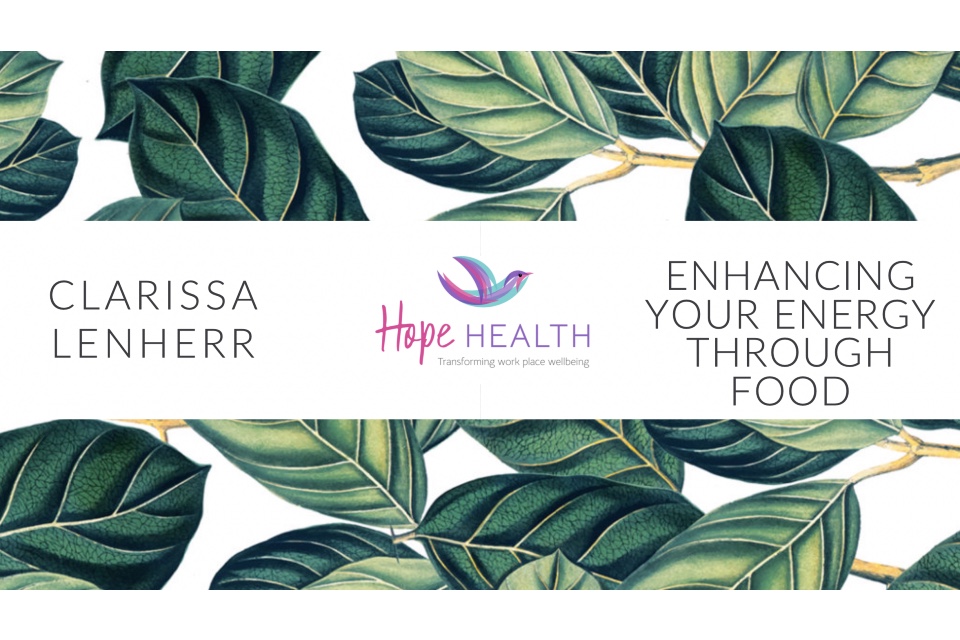Last week we teamed up with our friends at Hope Health to offer PA Life Club members an exclusive complimentary workplace wellbeing virtual session – Here’s what we learned…
The virtual Lunch & Learn session, Enhance Your Energy – How to eat for better energy & productivity was introduced by Hope Health’s Business Development Director, Emma Quainton, and presented by professional nutritionist, Clarissa Lenherr, covering off the following key areas ahead of a lively Q&A:
- Food & Energy – How To Balance Your Blood Sugar Levels
- Achieve A Balanced Plate & Portion Sizes
- How To Snack Effectively
- Nutrients For Energy
- The 101 On Caffeine & Hydration
- Natural Energy Boosters
Clarissa specialises in gut nutrition, which encompasses digestive concerns, weight management, hormone and thyroid Health and auto-immune conditions, so she’s a real authority in the space.
She started with an in depth look at blood sugar levels, which anyone who’s experienced that 3pm slump in energy at work can attest to being super important for wellbeing and productivity.
The key here, Clarissa explained, is balance – finding that healthy blood sugar level by understanding which foods affect blood glucose, and how to integrate the right foods more effectively into your diet, choosing plates that:
- Have plenty of vegetables & fruits (at least half your meal)
- Are a quarter high-protein foods
- Are a quarter whole grain foods
Think plates of food that are high in colour and you’re on the right track, said Clarissa.
Then it’s a case of adding the right fats (olive oil, nuts, seeds, avocado, coconut oil, dairy, etc).
In this respect, SMASH fish are super important – never heard of SMASH? As Clarissa explained it stands for fish high in Omega 3, so Salmon, Mackerel, Anchovies, Sardines & Herring. Or if fish is not your thing, nuts and seeds such as Chia, flax and walnuts.
And don’t forget your five a day!
Clarissa’s talk then detailed some delicious menu examples to give us all some inspiration (and which showed that eating healthily can be both tasty and educational!).
But what about when we get peckish between meals? No problem! Again, balance is key – feel free to snack, as long as you’re mixing protein, fat, carbs and veg in moderate portions.
Then it was back to school with a bit of science around the importance of mitochondrial energy and, specifically, Adenosine Triphosphate, which Clarissa described as the body’s ‘energy currency’. Intake of magnesium was highlighted as particularly beneficial as it contributes to so many of the body’s functions. The good news is that if your plates of food have lots of fruit and veg then you’re probably getting enough!
Staying with the nutrients theme, Clarissa explored sources of Iron and Vitamin D, both of which are crucial to helping the body with its energy needs.
Key takeaway (no, not that kind!): It’s not all about food.
That right, folks, you need to ensure you’re taking on plenty of liquids too, and the right ones at that. Clarissa’s golden rule here is to limit your caffeine intake to 400mg max per day – that way you’ll avoid the moods wings, jitteriness and irritation that often go hand-in-hand with caffeine over-consumption.
The good news here is that there are lots of easy caffeine-free swaps: Rooibos, Turmeric Latte, plus Herbal Teas such as Tulsi and Chicory Root Coffee.
But above all drink LOTS of water. Clarissa explained that 2% dehydration = 20% loss of energy output and recommends 8 glasses a day (about 2 litres) to keep ourselves topped up. And water doesn’t need to be boring – you can flavour it with berries, lemon, lime and herbs!
Finally, there are things we can all do outside of diet to help with maintaining balanced energy levels: Getting in your 7-9 hours sleep, get rid of blue lights near bedtime, get plenty of natural light during the day, avoiding stress and exercise.
You can download Clarissa’s full presentation slides by clicking here > Energy Hope Health 2021_PAL.
About Hope Health
Hope Health is a company which is committed to transforming workplace wellbeing by providing bespoke programs and stand alone services that promote positive mental health in the workplace.
Delivered by thoroughly engaging specialists, Hope Health’s virtual sessions aim to open up conversations surrounding mental health in the workplace and cover a wide range of topics including the Impacts of Covid-19, Men’s Mental Health, Nutrition, Sleep and Balancing Parenthood.
It offers services including Mental Health First Aid Training and an ongoing Lunch & Learn Series.
To find out more, visit www.hope-health.co.uk or contact Emma Quainton at emma@hope-health.co.uk / 0204 538 0758.















